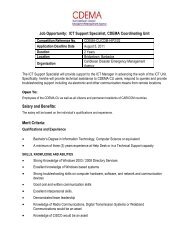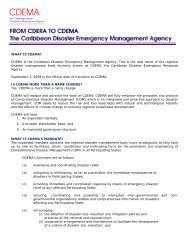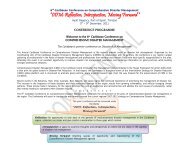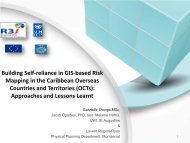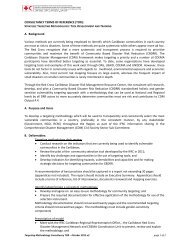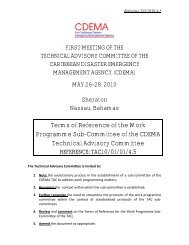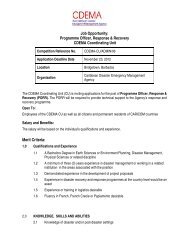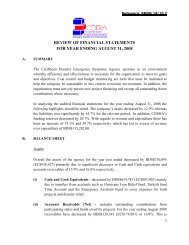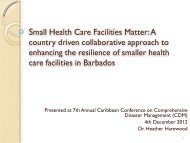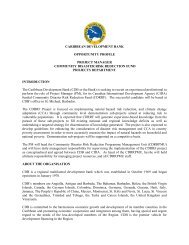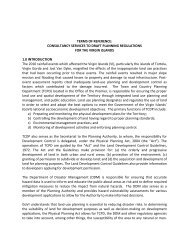Create successful ePaper yourself
Turn your PDF publications into a flip-book with our unique Google optimized e-Paper software.
Activity title<br />
Community-based<br />
Disaster Management<br />
Reforestation project<br />
Workshop: Climate<br />
Change Adaptation,<br />
Development and<br />
Disaster Reduction:<br />
Strengthening<br />
Community Resilience<br />
in the Caribbean.<br />
Community Disaster<br />
Preparedness<br />
Programmes<br />
Beneficiary<br />
community(ies) and<br />
country<br />
Completed in: Antigua &<br />
Barbuda, Jamaica,<br />
Guyana, Grenada, St.<br />
Kitts & Nevis, Trinidad &<br />
Tobago.<br />
To be completed in:<br />
Saint Lucia, St. Vincent<br />
& the Grenadines,<br />
Belize, Suriname,<br />
Dominica<br />
Grande Riviere,<br />
Trinidad<br />
Port of Spain, Trinidad<br />
La Pastora, Bourg<br />
Mulatresse, La Canoa,<br />
Debe, Penal and<br />
Barrackpore in Trinidad<br />
Key components and outputs Implemented by Date of<br />
implementation<br />
Community-based disaster<br />
preparedness training; guidelines for<br />
vulnerability and capacity assessment<br />
(VCA) to build safer, more resilient<br />
communities<br />
This community is currently<br />
implementing a community<br />
reforestation project.<br />
The project came about because the<br />
residents depend on the forest for their<br />
livelihood and reforestation is a way of<br />
addressing the problem of bush fires<br />
and landslides, which threaten their<br />
existence.<br />
The main aims of the workshop were<br />
to engage concerned partners on<br />
these issues and involve the<br />
communities themselves in addressing<br />
the consequences of climate change,<br />
specifically in the areas of human<br />
development and livelihood and to<br />
identify adaptation strategies to deal<br />
with the impact of climate change in<br />
vulnerable communities.<br />
The objective is to help people in<br />
communities prone to street and flash<br />
flooding, among other vulnerabilities,<br />
to help themselves in the event of a<br />
natural disaster. Communities will<br />
benefit from training in first aid, injury<br />
prevention, community mobilisation<br />
and disease prevention, among others.<br />
24<br />
The International<br />
Federation of Red<br />
Cross and Red<br />
Crescent Societies<br />
(IFRCS)<br />
Trinidad & Tobago<br />
Red Cross<br />
Society, the<br />
Ministry of<br />
Agriculture-<br />
Forestry Division<br />
and the Grande<br />
Riviere Tourism<br />
Development<br />
Organization<br />
ProVention<br />
Consortium, in<br />
collaboration with<br />
the International<br />
Federation’s<br />
Caribbean<br />
Regional<br />
Representation<br />
Office.<br />
The European<br />
Commission<br />
Humanitarian<br />
Office and the<br />
Finnish Red Cross<br />
Comments on bestpractice(s)<br />
<br />
<br />
<br />
community level<br />
Participatory<br />
approach to<br />
vulnerability and<br />
capacity<br />
assessment<br />
Micro-mitigation<br />
projects to reduce<br />
community<br />
vulnerability<br />
current Project<br />
conceptualised and<br />
driven by community<br />
December 2009 –<br />
January 2012<br />
<br />
Capacity built in<br />
practical and<br />
necessary areas<br />
(e.g. first aid) within<br />
communities to help<br />
themselves.



